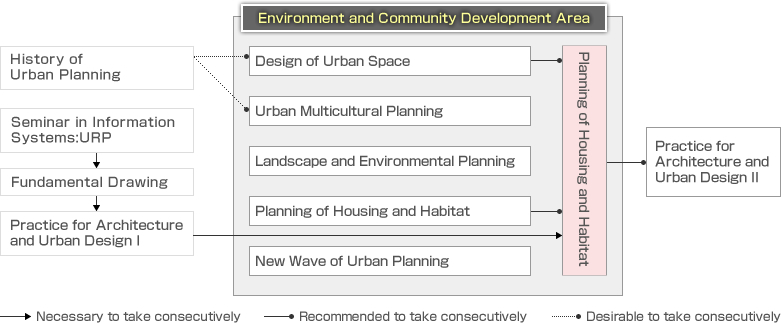Environment and Community Development Area
The Environment and Community Development area consists of: 5 courses based on lectures to learn practical theories, and study example cases of environmental maintenance and town development, involving cities, houses, and green areas as well as [Workshop on Living Environment Planning] to acquire the thinking, design, and presentation skills needed for specific planning; a total of 6 courses.
| Course name | Course description | Target year |
|---|---|---|
| Seminar in Living Environment Planning | This seminar aims to improve students’ ability to design urban and architectural spaces. Students, who have completed design-related courses ([Fundamental Drawing] and [Practice for Architecture and Urban Design I]) during or before the second year, will learn methods and techniques to design collective houses, applying the basic methods of design drafting that they have learned so far. | 3 – 4 |
| Planning of Housing and Habitat | This course will explain the history of housing, impact of post-war social and lifestyle changes on houses and living environments in urban and rural areas, and current challenges of housing in Japan. | 2 – 4 |
| Design of Urban Space | This course will outline recent trends in architectural and urban design, while introducing various vocabularies to create attractive spaces. Subsequently, it will explain their functional structures and building-related regulations such as the Building Standards Act (for individual buildings). Students will also acquire basic competencies for space design through design tasks. | 2 – 4 |
| Landscape and Environmental Planning | This course will systematically discuss ideal urban/regional planning based on the conservation of the natural environment, historical resources, and open spaces, giving concrete examples to illustrate historical development, contemporary issues, and future directions. | 2 – 4 |
| New Wave of Urban Planning | This course will critically review the planning theories of the 20th century as the theoretical background of modern town development, and mainly discuss the planning process, participation, planning administration and methods, and planning regulations. Furthermore, to help students understand modern town development in actual settings, it will explain various topics such as the revitalization of central urban and urban-rural areas and sustainable environment-friendly town development. | 2 – 4 (recommended in 2nd-year) |
| Urban Multicultural Planning* | In this course, students will observe urban spatial structure in Asian countries based on history and using videos. They will also discuss necessary ideas and methods for multicultural urban and regional planning, with the current situation, where Asian spaces are being disseminated in non-Asian cities, taken into consideration. | 2 – 4 |
*: Provided by collaborative staff (from the College of International Studies)




